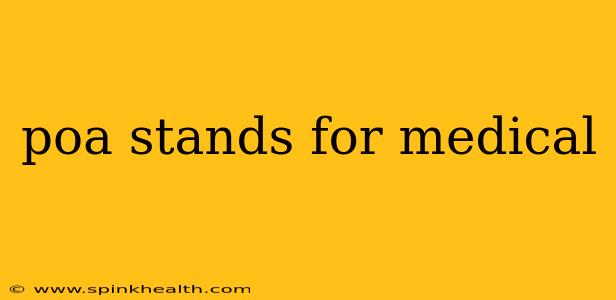POA: Unraveling the Mystery Behind the Medical Acronym
The medical world is full of acronyms, and POA is one that often leaves people scratching their heads. While it might seem cryptic, understanding its meaning is crucial, especially when navigating healthcare discussions. Let's delve into the world of POA in a medical context and dispel any confusion. The truth is, POA doesn't have one single, universally accepted meaning in medicine. Its meaning depends heavily on the context. This article will explore the most common interpretations, shedding light on what POA likely refers to in different medical scenarios.
What does POA stand for in medical terms?
This is the million-dollar question! The answer isn't straightforward, but we'll examine the most probable meanings:
-
Plan of Action: In many instances, POA simply stands for Plan of Action. This is particularly relevant in situations involving patient care or treatment strategies. Imagine a team of doctors discussing a complex case. They might collaboratively develop a POA outlining the diagnostic tests, treatments, and monitoring steps needed to address a patient's condition. This plan is dynamic and can be adjusted as the patient's condition evolves.
-
Power of Attorney: While not strictly a medical acronym, POA is frequently used to denote Power of Attorney. This is a legal document that grants someone else the authority to make decisions on behalf of an individual, especially if that individual is incapacitated or unable to make decisions for themselves. In healthcare, this is crucial for managing medical care when a patient lacks the capacity to do so. The designated person, the attorney-in-fact, can make decisions regarding treatment, finances related to healthcare, and more.
-
Problem-Oriented Approach: In certain clinical settings, POA might represent a Problem-Oriented Approach to patient care. This method focuses on identifying and addressing specific patient problems, systemically tracking progress, and formulating plans accordingly. It’s a systematic way to document and manage patient care, prioritizing the most pressing concerns.
How is POA used in healthcare?
The use of POA depends on the context. As mentioned, a Plan of Action might be discussed during a clinical meeting, detailed in a patient's chart, or referenced in treatment notes. A Power of Attorney becomes relevant when decisions must be made concerning a patient’s medical care and finances, especially when the patient is unable to make those decisions themselves. This ensures continuity of care and protects the patient's interests. A Problem-Oriented Approach would be reflected in the way patient information is organized and charted.
What are the different types of POA?
While this is primarily relevant to Power of Attorney, understanding its different forms is valuable:
-
Durable Power of Attorney: This type of POA remains in effect even if the principal (the person granting the power) becomes incapacitated. It is crucial for healthcare decision-making because it ensures the designated person can continue to act on the principal's behalf.
-
Limited Power of Attorney: This grants authority for specific actions only. It might, for example, grant authority only to handle financial matters related to medical bills, but not other medical decisions.
-
Springing Power of Attorney: This type of POA takes effect only under certain circumstances, usually upon the principal becoming incapacitated.
These distinctions are vital because they define the scope of the designated person's authority.
What are the implications of POA in medical settings?
The use of POA, particularly in the context of Power of Attorney, carries significant implications. It profoundly affects the ability to receive appropriate healthcare and manage related finances. It's essential to ensure that the correct POA is in place and that the designated person is aware of their responsibilities and the limitations of their authority. Clear communication and legal counsel are vital in these situations. A well-defined POA ensures smooth and ethical healthcare management when a patient cannot advocate for themselves.
This exploration of POA in a medical context should provide a clearer understanding of this often ambiguous acronym. Remembering that context is key when encountering POA in healthcare settings will help avoid misunderstandings and ensure appropriate management of healthcare issues. Always clarify the specific meaning when uncertainty arises.

